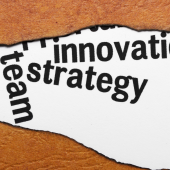Scenarios to Prepare for Change – Allstate, Jpmc, Sears, at&t
All businesses hurting in today's economy must significantly change if they want to improve their performance. In the early 1900s the world saw the advent of several new machines ushering in the industrial era. But, the economy was based on agriculture – and largely the "family farm." As the industrial era expanded landowners tried to Defend & Extend their old business models by leveraging up the family farms – borrowing more and more money to plant "fencerow-to-fencerow" as it was called. Borrowers overworked the land, and with all the debt piled on when a glitch happened (a combination of drought and falling commodity prices from expansion) the mountain of debt collapsed. The beginnings of the Great Depression hit the farmers in the 1920s. The coming of the industrial revolution made old Success Formulas based on land ownership and agriculture obsolete – and no amount of debt could defer the shift forever. It took 10 years (into the 1940s) to fully transition to the new economy, and when we did Ford, GM and other industrial giants overtook the land barrons of the earlier era.
I was reminded of this today when discussing scenario planning with Diane Meister, Managing Director of Meridian Associates in Chicago. Today she sees the deteriorating Success Formulas in her clients. Companies that keep trying to apply Industrial era Success Formulas in what is now an information economy. When they aren't prepared for big shifts – it can be devastating. But those who do prepare can improve position quickly. She told me how one of her clients had an excellent business selling toys to FAO Schwartz and other top toy chains. But Meridian could see that the growth of Target created a viable scenario for a big shift in how toys would be distributed. She implored her client to prepare for possibly the failure (note – failure – not just weakness) of several big toy chains. Good thing she did, within 2 years most of her client's retail distribution was bankrupt. Only by using scenarios to prepare for a big market shift were they able to survive – in fact come out a leader – due to the big shifts happening in retail as a result of the change in markets. (Don't hesitate to contact her firm at the link – good stuff!)
As we transition into the information economy, big changes are going to happen to all businesses. The source of value, and competitiveness, has changed. Today the Allstate Insurance's CEO was quoted in Crain's "Insurer's Should Have Federal Regulator." And in an article at Marketwatch.com, "Dimon Backs Regulation", the CEO of J.P. Morgan Chase told the U.S. Chamber of Commerce he backs additional mortgage regulation. Both of these leaders are looking forward, and recognize that markets have shifted. New regulations will be critical to success. Their future scenarios show it will take a different approach to be a global competitor in 2015 – to be a winner in the global information economy that won't support industrial era Success Formulas.
Not everyone gets it. Also at Marketwatch.com in "AT&T Chief Sounds Alarm", the AT&T CEO decries rising health care costs and worries system changes will hurt his competitiveness. Wake up! What sort of scenario is he using that expects America to keep the current health care system – and the current employer-paid insurance? Even insurance companies now recognize the system is broken and needs change. In no other country are health care costs "baked in" to the cost of a company's P&L. Think about it – even where there is national health care (Britain, France, Canada, Germany, etc.) the companies don't carry the cost as a line item they must recoup via sales and margin. Elsewhere, the cost of health care is born by society through taxes. The reality is that any American company trying to compete has a whole host of incremental costs on its shoulders because we ask employers to pay in order to keep personal income taxes low. Until we change the whole basis of how America chooses to insure its population, employers are being forced to carry costs not seen by offshore competitors. In a global marketplace – this sort of "yesterday thinking" will not survive. Employers should be leading the charge for national health care – just so they can get the issue out of their plethora of problems and off the backs of their P&Ls!
Those that don't change will end up out of the game. Because they didn't do effective scenario planning, that considered the rise of "upscale discounters," FAO Schwartz (mentioned earlier) and Zany Brainy's failed — not even a Tom Hanks movie could keep customers coming in the doors. Markets are merciless in taking down companies that can't globally compete on what's important. We can prop up GM for a short time, but no country can afford to try to keep its people working (avoid unemployment costs) and insured by pumping money into a dysfunctional car company that isn't competitive. Sears has ignored the trends, and is one of the "walking dead." Once the world's greatest retailer, it built what was for years the world's tallest building (now 2nd). But now Crain's has reported in "Willis will get Sears Tower naming rights" that soon the great building the great retailer built in its home town of Chicago will likely be renamed for a London insurance company. Of course, Sears sold the building years ago in its effort to subsidize its failiing retail business – and hasn't even been a tenant in the building for decades. It won't be long before no one even remembers Sears. Sears remained Locked-in to what it once was, and ignored scenarios about a different future that would require change.
The world has shifted. If your scenarios for the future expect a return to old practices – well, that isn't going to happen. If you want to be a leader in the next economy, you better start building new scenarios TODAY!
error correction - in yesterday's blog I inadvertently said I was "not" twittering. Talk about a badly mistaken typo! I meant the opposite. I am twittering and hope you all hook up so we can tweek each other.



